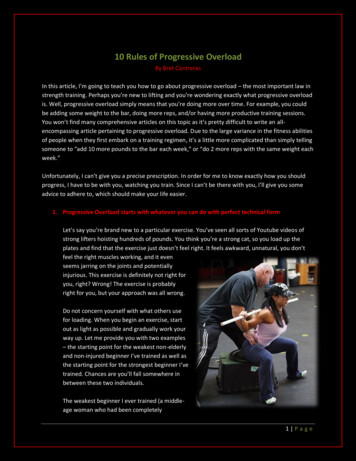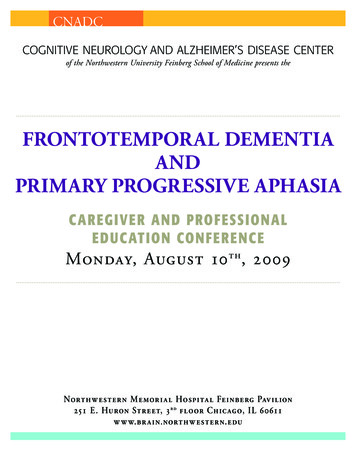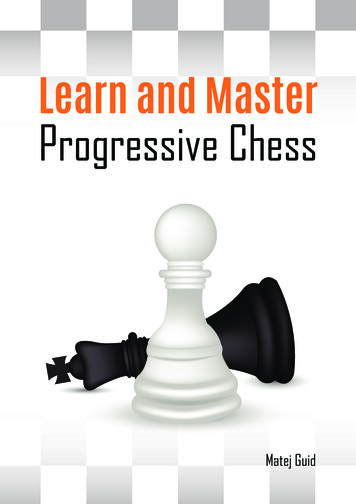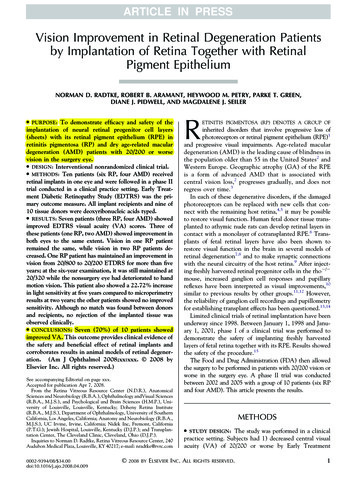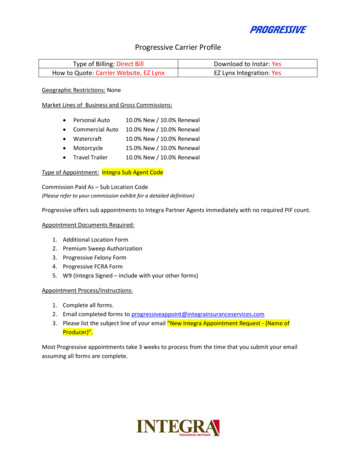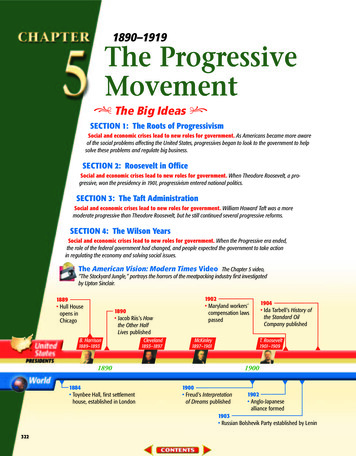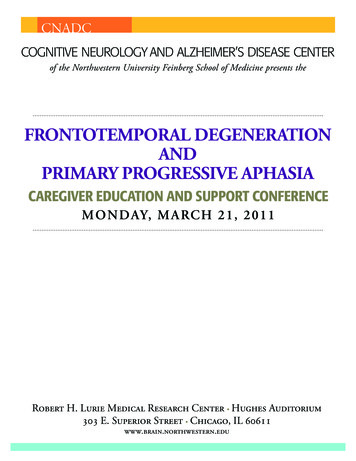
Transcription
CNADCCOGNITIVE NEUROLOGY AND ALZHEIMER’S DISEASE CENTERof the Northwestern University Feinberg School of Medicine presents theFRONTOTEMPORAL DEGENERATIONANDPRIMARY PROGRESSIVE APHASIACAREGIVER EDUCATION AND SUPPORT CONFERENCEM O N D AY, M A RC H 2 1 , 2 0 1 1Robert H. Lurie Medical Research Center Hughes Auditorium303 E. Superior Street Chicago, IL 60611www.brain.northwestern.edu
CNADCFRONTOTEMPORAL DEGENERATION (FTD)ANDPRIMARY PROGRESSIVE APHASIA (PPA)C A R E G I V E R E D U C AT I O N A N D S U P P O R T C O N F E R E N C EMARCH 21ST, 2011AGENDA7:30-8:30 AMRegistration and Vendor Fair8:30-9:00 AMWelcomeMarsel Mesulam, MD, CNADC DirectorDarby Morhardt, MSW, LCSW, CNADC Education DirectorChristina Wieneke, BA, CNADC Research Project Manager9:00-9:15 AMOpening RemarksSharon Denny, MA, Association for Frontotemporal Degeneration (AFTD)Ellayne Ganzfried, MS, CCC-SLP, National Aphasia Association (NAA)9:15-9:55 AMKeynote Address: “Perspectives on FTD and PPA”Bradley F. Boeve, MD, Professor of Neurology, Mayo Clinic, Rochester9:55-10:15 AM“Assessing and Treating Mood and Behavioral Symptoms in FTD and PPA”Deborah Reed, MD, Assistant Professor of Psychiatry, Northwestern University10:15-10:30 AMBreak and Vendor Fair10:30 AM-noonQuestion-and-Answer SessionDr. Boeve, Dr. Reed, Eileen Duhig, Nancy Gapinski, and Lorene Schlienoon-1:00 PMLunch and Vendor Fair1:15-2:15 PMBreakout Session 12:30-3:30 PMBreakout Session 23:45-4:15 PMClosing Plenary: “Affirm Yourself for Caregiver Challenges”Janet Edmunson, MEd, Author of Finding Meaning with Charles: Caregiving withLove Through a Degenerative Disease
CNADC 2011 Northwestern University Cognitive Neurology and Alzheimer’s Disease Center, Chicago, IL www.brain.northwestern.edu
CNADCTABLE OF CONTENTSPageContent7Program Highlights17About the CNADC23Disease Information31“Perspectives on FTD and PPA”Bradley Boeve, MD41Afternoon Session Handouts85“Affirm Yourself for Caregiver Challenges”Janet Edmunson, MEd912011 Caregiver Resource List 2011 Northwestern University Cognitive Neurology and Alzheimer’s Disease Center, Chicago, IL www.brain.northwestern.edu3
CNADCTHANK YOU!The Cognitive Neurology and Alzheimer’s Disease Center of theNorthwestern University Feinberg School of Medicine thanks theAssociation for Frontotemporal Degeneration and theNational Aphasia Association for their generous support of this special event. 2011 Northwestern University Cognitive Neurology and Alzheimer’s Disease Center, Chicago, IL www.brain.northwestern.edu4
CNADCTHANK YOU!2011 Planning Committee Members:CNADC Faculty and StaffJoseph BoyleDarby MorhardtMary O’HaraKristen OshynJaimie RobinsonEmily RogalskiChristina WienekeKristine Zachrichand all volunteers who have made this day a success!The CNADC appreciates your dedication and commitment to makingthis day possible. 2011 Northwestern University Cognitive Neurology and Alzheimer’s Disease Center, Chicago, IL www.brain.northwestern.edu5
CNADC 2011 Northwestern University Cognitive Neurology and Alzheimer’s Disease Center, Chicago, IL www.brain.northwestern.edu6
CNADCPROGRAMHIGHLIGHTS 2011 Northwestern University Cognitive Neurology and Alzheimer’s Disease Center, Chicago, IL www.brain.northwestern.edu7
CNADCPROGRAM HIGHLIGHTSKeynote SpeakerBradley F. Boeve, MDProfessor of NeurologyMayo Clinic College of MedicineMayo Clinic RochesterDr. Bradley F. Boeve received his Doctor of Medicine degree from the University of Florida in1991. He underwent training in Internal Medicine (internship), Neurology (residency), BehavioralNeurology (fellowship), and Sleep Medicine (fellowship) in the Mayo Graduate School of Medicineat Mayo Clinic in Rochester, Minnesota. He joined the Mayo Clinic staff in 1997 and now servesas Chair of the Division of Behavioral Neurology of the Mayo Foundation, Head of the BehavioralNeurology Section at Mayo Clinic Rochester, Director of the Behavioral Neurology FellowshipProgram at Mayo Clinic Rochester, Co-Director of the Clinical Core of the Mayo Alzheimer’sDisease Research Center, and is Professor of Neurology in the Mayo Clinic College of Medicine.He is a Diplomate of the American Board of Psychiatry and Neurology, American Board of SleepMedicine, and United Council on Neurologic Subspecialities (Behavioral Neurology andNeuropsychiatry), and is a member of the American Medical Association, American Academy ofNeurology, American Neurological Association, American Academy of Sleep Medicine, Societyfor Cognitive and Behavioral Neurology, and Movement Disorders Society. He also serves on theMedical/Scientific Advisory Councils of the Association from Frontotemporal Dementias and LewyBody Dementia Association, and state chapter of the Alzheimer’s Association.Dr. Boeve’s clinical and research interests include normal aging, mild cognitive impairment,Alzheimer’s disease as well as the non-Alzheimer degenerative dementias (e.g., dementia withLewy bodies, frontotemporal dementia, primary progressive aphasia, corticobasal degeneration,posterior cortical atrophy), the neurologically-based sleep disorders (e.g., REM sleep behaviordisorder, narcolepsy, restless legs syndrome), prion disorders, neurogenetics, and theautoimmune/inflammatory encephalopathies. He has received grant support from the Alzheimer’sAssociation, National Institute on Aging, and National Institute of Neurological Disorders andStroke. He has authored 26 book chapters and has contributed to over 200 papers in peerreviewed journals. 2011 Northwestern University Cognitive Neurology and Alzheimer’s Disease Center, Chicago, IL www.brain.northwestern.edu8
CNADCDeborah A. Reed, MDDr. Deborah Reed is Assistant Professor of Clinical Psychiatry and Behavioral Science, a collegementor, and the former Division Director of Geriatric Psychiatry at Northwestern University Feinberg Schoolof Medicine. She is also the Consulting Psychiatrist at the Cognitive Neurology and Alzheimer’s DiseaseCenter (CNADC).Dr. Reed received her bachelor’s degree in Biology from the University of Pennsylvania, her Doctor ofMedicine degree from the Medical College of Pennsylvania, and completed her residency in AdultPsychiatry at Northwestern Memorial Hospital. She has participated in clinical drug trials for patients withFTD and PPA at Northwestern. Her interests include the pharmacologic management of cognitive andbehavioral syndromes in patients with dementia, attention deficit disorder and other neurologic conditions.Janet M. Edmunson, M.EdWhile working full-time, Janet took care of her husband, Charles, during the five years he fought amovement disorder with dementia. Janet wrote about her experience in her book, Finding Meaning withCharles: Caregiving with Love through a Degenerative Disease.Janet has over 30 years’ experience in the health promotion field. She retired in May 2007 as Director ofthe Prevention & Wellness for a staff of 20 at Blue Cross Blue Shield of Massachusetts. Since retirement,she has been a national inspirational speaker having spoken to over 200 groups in the last couple of years.Janet is Chair of the Board of Directors for the Foundation for PSP CBD and Related Brain Diseases. Sheis also on the Board of Trustees for the Employee Ownership Foundation. She is a former President of theAssociation for Worksite Health Promotion. Janet has a Master’s degree from Georgia State University. 2011 Northwestern University Cognitive Neurology and Alzheimer’s Disease Center, Chicago, IL www.brain.northwestern.edu9
CNADCPROGRAM HIGHLIGHTSAfternoon Breakout Sessions for CaregiversNewly Diagnosed FTDA new FTD diagnosis brings on feelings of devastating loss and uncertainty. Families mayfeel overwhelmed trying to manage the personality and behavioral changes as they search forguidance about what to expect, how to plan for the future, and what living with FTD will be like.This group will focus on the experience of a new diagnosis, the first steps to take, and whereto find ongoing guidance, resources, and support. It will explore both immediate concerns andlonger-term issues about how this illness will affect a loved one and a family.Newly Diagnosed PPAFamilies may be uncertain about what to do next when a person is diagnosed with PPA. Howshould the frustrations and struggles resulting from changing communication abilities beaddressed? There are important considerations for the present and the future that familiesshould discuss early on. This group will focus on both the first steps and where to find ongoingguidance, resources, and support for the person with PPA and the family.Legal PlanningOnce a person is diagnosed with a dementia, family and friends should help him or her tomake legal plans early on so that, if possible, the person is able to participate. Lack of insightcan result in the person’s being unable or resistant to making these plans. In some cases,guardianship is necessary. Making legal plans for health care and long-term care includesdiscussing finances and property and naming another person to make decisions on behalf ofthe person. This group will discuss what families should know about legal planning and how tobegin this process.Managing BehaviorsThe range of possible new behaviors of persons with bv (behavioral variant) FTD may be difficultfor families to manage. This group will discuss environmental modifications, psychosocialapproaches, and pharmacological interventions for inappropriate, impulsive, aggressive,compulsive, paranoid, and other challenging behaviors. It will also explore how these behaviorsaffect the family and how the family can cope.Communication Challenges in PPAThe primary goal of speech and language therapy for PPA is to improve a person’s abilityto communicate by helping him or her to use remaining language abilities, compensate forlanguage problems, and learn other methods of communication. This group will discussalternative and augmentative forms of communication, the use of low- and high-techcommunication devices, and other methods of supporting language abilities. 2011 Northwestern University Cognitive Neurology and Alzheimer’s Disease Center, Chicago, IL www.brain.northwestern.edu10
CNADCPROGRAM HIGHLIGHTSAfternoon Breakout Sessions for CaregiversFamilies with Children and TeensSince PPA and FTD have a young average age of onset, a parent may become affected whenchildren are still living at home. The stress brought on by the diagnosis is profound; families faceuncertainity about not only the disease, but also its effect on children. This group will explore theexperiences of children and teens who have parents with FTD or PPA.Planning for Future and Palliative CarePlanning for future care can feel complicated and overwhelming for caregivers. There is a greatdeal to consider in exploring what care options work best for the person diagnosed and his orher family. This group will provide a comprehensive review of care options throughout the courseof the disease. It will also review palliative approaches to care, a comfort-based approach thatfocuses on maximizing quality of life.Starting a Support Group in Your AreaSupport groups offer a safe environment in which family caregivers share their experience withothers who truly understand. There is a need for more support groups specific to FTD andPPA. This group will discuss how -- with the help from the AFTD, the NAA, and the Alzheimer’sAssociation -- to begin, sustain, and maintain a group specifically for caregivers of people withFTD or PPA.Genetics and FTD/PPAFTD and PPA can be described as inherited, familial, or sporadic. In inherited cases, each childor sibling of the person with the disease has a 50 percent chance of developing it. In a familialcase, family members of an affected individual have an increased risk of developing the disease,although this increase is not well defined. The majority of FTD/PPA cases are sporadic, meaningthe disorder develops by chance and the children or siblings of the affected individual do nothave an increased risk for developing the disorder. This group will discuss the genetics of FTDand PPA, including what we know and what we still hope to uncover through future research. 2011 Northwestern University Cognitive Neurology and Alzheimer’s Disease Center, Chicago, IL www.brain.northwestern.edu11
CNADCPROGRAM HIGHLIGHTSAfternoon Breakout Sessions for CaregiversGroup FacilitatorsNicole Batsch has over 15 years of experience working for not-for-profits developing programs insenior centers, Alzheimer’s care, applied research, and family caregiving in Florida, Chicago, andArizona. She works for the Alzheimer’s Association Greater Illinois Chapter as the Director of EarlyStage & Support Services deveoping programs that directly help the diagnosed individual in the earlystages of Alzheimer’s disease experience an increased sense of security, self-esteem and hope. Shealso supervises the over 100 support groups in the Chapter’s 68 county service area.Bradley Boeve, MD is Chair of the Division of Behavioral Neurology of the Mayo Foundation, Headof the Behavioral Neurology Section at Mayo Clinic Rochester, Director of the Behavioral NeurologyFellowship Program at Mayo Clinic Rochester, Co-Director of the Clinical Core of the MayoAlzheimer’s Disease Research Center, and Professor of Neurology in the Mayo Clinic College ofMedicine. He has authored 26 book chapters and has contributed to over 200 papers inpeer-reviewed journals.Henrietta Boudros MA, CCC-SLP is a Chicago native with over ten years of clinical experienceworking with adults who have cognitive communication disorders. She has worked closely with theteam at CNADC to assist in establishing appropriate treatment plans for individuals diagnosed withPPA/FTD.Joan Brzezinski is a full-time worker, mother of a now 27-year old daughter, Theresa, and caregiverto her father for some 20 years and then to her husband Tom. Tom was diagnosed with FTD at theage of 53 and passed away at the age of 59 in July 2009. The Brzezinskis are a family of caregiversthrough and through, and Joan and Theresa continue to stay involved to try to make a difference.Theresa Brzezinski was a 19-year old college student when her father was diagnosed with FTD atage 53. Theresa received a degree in Public Relations at Bradley University; however, aftergraduation and one year of employment, Theresa stopped working full-time to assist her mother inher father’s care. Theresa’s father passed away at the age of 59, in 2009. Theresa and her mother,Joan continue to help many families by talking about their experience and what they learned alongthe way.Derin Cobia, PhD is a postdoctoral fellow in the Department of Psychiatry and BehavioralSciences at the Northwestern University Feinberg School of Medicine. He earned his degree inclinical psychology, specializing in neuropsychology. His research interests are on the use ofneuroimaging techniques to understand how changes in brain structure relate to languagefunctioning in PPA. 2011 Northwestern University Cognitive Neurology and Alzheimer’s Disease Center, Chicago, IL www.brain.northwestern.edu12
CNADCCaregiver Group Facilitators, continuedJoseph Cooper, MD completed his undergraduate degree in Neuroscience at Johns HopkinsUniversity. He then completed medical school and residency in Psychiatry at the University ofChicago. In July 2010, he joined the Cognitive Neurology and Alzheimer’s Disease Center atNorthwestern University as a fellow of Neuropsychiatry and Behavioral Neurology.Sharon S. Denny, MA is the Program Director at the Association for Frontotemporal Degenerationwhere she directs patient and caregiver support and education initiatives. Since coming to AFTD in2008, her focus has been on the development and delivery of high-quality services for people withFTD, their families and the professionals working with them. Ms. Denny has a Masters degree inClinical Psychology and more than twenty-five years experience with nonprofit organizations thatserve people with medical and psychiatric disabilities.Amy and Eileen Duhig are daughters of Marty, who was diagnosed with FTD in March 2005. Theyare both employed full-time and go home to provide their mother respite on a weekly basis.Janna Dutton has been practicing in the area of elder law for more than 30 years. As a result, Jannahas the knowledge and depth of experience to skillfully navigate through a diverse assortment ofelder law matters, including trusts and estate planning, Medicaid and Medicare planning and applications and probate and estate administration. She is certified by the National Elder Law Foundationas an elder law attorney, and has held this certification since 1995.Janet Edmunson, M.Ed is Chair of the Board of Directors for the Foundation for PSP CBD andRelated Brain Diseases. She was a caregiver to her husband, Charles, during the five years he foughta movement disorder with dementia. Janet wrote about her experience in her book, Finding Meaningwith Charles: Caregiving with Love through a Degenerative Disease.Ellayne Ganzfried, MS, CCC-SLP is a speech-language pathologist and the Executive Director ofthe National Aphasia Association. She is Past President of the NYS Speech Language HearingAssociation (NYSSLHA), Long Island Speech Language Hearing Association (LISHA) and the Councilof State Association Presidents for Speech Language Pathology and Audiology (CSAP) and remainsactive in these associations. Ellayne is a Fellow of the American Speech Language HearingAssociation (ASHA). Ellayne has written articles and presented regionally and nationally on a varietyof topics including aphasia, rehabilitation and leadership skills.Nancy Gapinski is a wife, married 4 1/2 years to Chris, who was diagnosed with PrimaryProgressive Aphasia in August 2008. They have 9 nephews, 3 nieces and 1 great-niece. Nancy isemployed full-time for a private company in the Risk Management Department.Tamar Gefen is a clinical psychology doctoral student at Northwestern University Feinberg Schoolof Medicine, specializing in clinical neuropsychology under the mentorship of Dr. Sandra Weintraub.She is conducting research at the CNADC on Primary Progressive Aphasia, Alzheimer’s disease, andon the underlying mechanisms of aging. 2011 Northwestern University Cognitive Neurology and Alzheimer’s Disease Center, Chicago, IL www.brain.northwestern.edu13
CNADCCaregiver Group Facilitators, continuedJosh Hauser, MD is Assistant Professor of Medicine and Palliative Care at Northwestern’s FeinbergSchool of Medicine, Director of Education at the Buehler Center on Aging, Health and Society andDirector of The Education on Palliative and End of Life Care (EPEC) Project. He practices in thepalliative care program at Northwestern Memorial Hospital. As Director of the EPEC Project, heoversees all of its conferences and curricula, including the development of the EPEC for VeteransCurriculum, the creation of EPEC-distance learning and the creation of a curriculum oncommunication skills for patients and caregivers, entitled Navigating the System.Julianne Hill is an award-winning journalist, filmmaker and documentarian whose work hasfocused on brain diseases, including essays aired on This American Life and run in Health and RealSimple. Hill also writes and produces videos for caregivers via the Alzheimer’s Foundation ofAmerica. She lives with her bright and beautiful 16-year old son, Nicolas, founder of CognitiveNeurology & Alzheimer’s Disease Center’s “Tri-4-Daddy” fundraiser, and they deeply empathize withyoung families struggling with frontal lobe dementia.Diana Kerwin, MD is a board certified internist and geriatrician specializing in cognition anddementia. She has an interest in risk factors, biomarkers and the effect of obesity and body weighton cognition and brain function. Dr. Kerwin is involved in clinical trials investigating new therapiesfor FTD, and the identification of biomarkers and neuroimaging studies for the diagnosis ofdementias such as Alzheimer’s disease.Jennifer Medina, PhD is currently completing a post-doctoral fellowship in clinical neuropsychologyat the University of Illinois at Chicago. She completed her PhD at Northwestern University FeinbergSchool of Medicine where her clinical and research training were focused on working with individualswith neurodegenerative disorders. Her research specifically examined mood disorders experienced byindividuals diagnosed with Primary Progressive Aphasia.Darby Morhardt, MSW, LCSW is Research Associate Professor, Director of Education and SocialWorker for the CNADC at Northwestern. She has 25 years clinical experience with persons withdementia and their families. Her research interests focus on the evaluation of quality of lifeenrichment programs for patients and families.Mary O’Hara, AM, LCSW is a social worker and the Assistant Director of Education atNorthwestern’s Cognitive Neurology and Alzheimer’s Disease Center (CNADC). In addition tohelping facilitate the CNADC’s Quality of Life Enrichment Programs, Mary also provides educationand support to diagnosed persons and their families in the Memory Health Clinic.Kristen Oshyn is a social work intern at the Cognitive Neurology and Alzheimer’s Disease Center.She is currently a second-year MSW candidate in the Older Adults program of study at theUniversity of Chicago’s School of Social Service Administration. Kristen plans to work with olderadults and their families when she graduates.Julia Rao, MS joined the CNADC in September 2008 as a graduate student in Northwestern’sClinical Neuropsychology program and works in the lab of Dr. Sandra Weintraub. She is a graduateof psychology from the University of Wisconsin-Madison and is now involved with projectsresearching Primary Progresssive Aphasia as well as SuperAging. 2011 Northwestern University Cognitive Neurology and Alzheimer’s Disease Center, Chicago, IL www.brain.northwestern.edu14
CNADCCaregiver Group Facilitators, continuedDeborah Reed, MD is Assistant Professor of Clinical Psychiatry and Behavioral Science, a collegementor, and the former Division Director of Geriatric Psychiatry at Northwestern University FeinbergSchool of Medicine. She is also the Consulting Psychiatrist at the Cognitive Neurology andAlzheimer’s Disease Center (CNADC). Her interests include the pharmacologic management ofcognitive and behavioral syndromes in patients with dementia, attention deficit disorder and otherneurologic conditions.Mary Beth Riedner and her husband Steve have been married for 38 years. Steve was diagnosedwith Primary Progressive Aphaisa in the fall of 2006. They have three grown children and twoadorable grand-daughters. Mary Beth retired in 2008 from Roosevelt University where she served asUniversity Librarian for nine years.Jaimie Robinson, MSW, LCSW is the Resource Navigator and Young Onset Coordinator at theNeurobehavior and Memory Clinic of the Cognitive Neurology and Alzheimer’s Disease Center. Inaddition to providing patients and families with symptom specific ideas, interventions and resources,she provides education and support for patients and families living with a young onset form ofdementia.Emily Rogalski, PhD is an Assistant Research Professor at the CNADC. Dr. Rogalski is aneuroscientist whose research has focused for more than seven years on the language-baseddementia PPA, including identifying risk factors, genetic features and structural neuroimagingmarkers of the syndrome.Lorene Schlie is a mother and grandmother, married 43 years to Ron, who was diagnosed with FTDMarch 2006. She is employed full time and is Ron’s advocate and caregiver. In March 2008, shestarted an FTD support group with eight people that has grown to fifteen plus caregivers and nowincludes other dementias.HyungSub Shim, MD is a behavioral neurology fellow at the Cognitive Neurology and Alzheimer’sDisease Center and Department of Neurology of Northwestern University Feinberg School ofMedicine. He earned his medical degree at the Medical College of Wisconsin, and did his neurologyresidency at the University of Iowa.Sandra Weintraub, PhD is Professor of Psychiatry, Neurology and Psychology at NorthwesternUniversity Feinberg School of Medicine and the Director of Neuropsychology in the CNADC. Herresearch focuses on the neuropsychology of primary progressive aphasia and frontotemporaldementia.Christina Wieneke joined the CNADC in late 2006. She is the research project manager for theLanguage in PPA research study and a facilitator of the PPA Education and Support Group. Shereceived her bachelor’s degree in Behavioral Neuroscience from Purdue University in 2006.Kristine Zachrich has been with the CNADC since August 2009 and is a Research Study ProgramsCoordinator. She received her bachelor’s degree in Communication Disorders from Bowling GreenState University in 2008. 2011 Northwestern University Cognitive Neurology and Alzheimer’s Disease Center, Chicago, IL www.brain.northwestern.edu15
CNADC 2011 Northwestern University Cognitive Neurology and Alzheimer’s Disease Center, Chicago, IL www.brain.northwestern.edu16
CNADCABOUT THE CNADC 2011 Northwestern University Cognitive Neurology and Alzheimer’s Disease Center, Chicago, IL www.brain.northwestern.edu17
CNADCWHO WE ARECognitive Neurology and Alzheimer’s Disease CenterNorthwestern University Feinberg School of MedicineMission:The Cognitive Neurology and Alzheimer’s Disease Center (CNADC) is amultidisciplinary organization dedicated to the following pursuits:1. Conducting research to discover how the brain coordinates cognitivefunctions such as memory, language, attention, and emotion.2. Discovering causes and treatments for diseases that disrupt these functions,such as Alzheimer’s disease, frontotemporal degeneration and primaryprogressive aphasia.3. Transferring the benefits of this research to patients and their families.4. Training researchers and clinicians who want to work in this field.320 East Superior Street, Searle 11th Floor, Chicago, IL 60611Phone: 312-908-9339, Fax: 312-908-8789, western.edu 2011 Northwestern University Cognitive Neurology and Alzheimer’s Disease Center, Chicago, IL www.brain.northwestern.edu18
CNADCDedicated toPatient CareNeurobehavior and Memory ClinicNorthwestern Medical Faculty Foundation676 North St. Clair Street, Suite 945Chicago, IL 60611312-695-9627Research and EducationAlzheimer’s Disease Center320 E. Superior Street, Searle 11Chicago, IL 60611312-926-1851www.brain.northwestern.eduMaking a Difference Every DayResearch directions Research programs for people with and without dementia Clinically testing new drug therapies for Alzheimer’s disease (AD) and Frontotemporal Degeneration (FTD) Studying the effect of sleep deficits on memory and cognitive function Measuring the impact of stress on AD’s and dementia’s progression Causes and treatments of Primary Progressive Aphasia (PPA), FTD, and other early onset dementia Identifying brain factors associated with “SuperAging” Treatment and prevention of dementia diseases Nature of cognitive and behavioral changes in dementiaPrograms that inform and support Annual Alzheimer Day The Buddy ProgramTM The Memory EnsembleTM Early-Stage Memory Loss Education and Support Group FTD/PPA Caregiver Conference FTD and PPA Caregiver Support Group Spousal/Partner Support Group Support Group for Adult Children Younger Onset AD Education and Support Group PPA Patient Support Group Mindfulness Practice for Stress and DepressionCommunity outreach and partnerships Alzheimer’s Assocation - Greater Illinois Chapter Association for Frontotemporal Degeneration National Aphasia Association Coalition of Limited English-Speaking Elderly Erie Family Health Center Francis J. Atlas Regional Senior Center of the Chicago Department of Senior Services South Side Dementia Consortium 2011 Northwestern University Cognitive Neurology and Alzheimer’s Disease Center, Chicago, IL www.brain.northwestern.edu19
CNADCNeurobehavior and Memory Health ClinicNorthwestern Medical Faculty FoundationCare for Patients and Families:The Neurobehavior & Memory Clinic is designed to meet the needs of persons experiencing memoryloss or other symptoms of dementia, and their families.Services Include: Evaluation and follow-up care by behavioral neurologists who specialize in the diagnosis andtreatment of dementia syndromesEvaluation of memory and other thinking abilities with the use of specialized tests given by aclinical neuropsychologistManagement of medication for memory disordersThe opportunity to participate in clinical research and clinical drug trialsPsychiatric evaluation and treatment for mood and behavior disorders associated withneurological diseaseEducation and counseling for patients and familiesSymptom specific interventions and strategiesInformation and referral to other supportive servicesA Dedicated Clinical TeamBehavioral NeurologistsM.-Marsel Mesulam, MD, DirectorDarren R. Gitelman, MDJay Gottfried, MD, PhDJaime Grutzendler, MDJoseph Cooper, MDHyungSub Shim, MDGeriatricianDiana Kerwin, MDNeuropsychiatristDeborah Reed, MDResource Navigator &Young Onset CoordinatorJaimie Robinson, MSW, LCSWNeuropsychologistsBeth Borosh, PhDNancy Johnson, PhD, ABPP-CNSandra Weintraub, PhD, ABPP-CNSocial WorkersDarby Morhardt, MSW, LCSWMary O’Hara, AM, LCSWClinic ManagerCori MalonePatient Access RepresentativeAnthony Nowaske676 North St. Clair Street, Suite 945, Chicago, IL 60611Phone: 312-695-9627, Fax: 312-695-6072 2011 Northwestern University Cognitive Neurology and Alzheimer’s Disease Center, Chicago, IL www.brain.northwestern.edu20
CNADCCURRENT FTD/PPA RESEARCH ATNORTHWESTERNLanguage in Primary Progressive Aphasia: The purpose of the study is to gain a better understanding ofthe progression and characterization of primary progressive aphasia (PPA). To do this, we look at manydifferent aspects of the disease: neur
Neurology Section at Mayo Clinic Rochester, Director of the Behavioral Neurology Fellowship Program at Mayo Clinic Rochester, Co-Director of the Clinical Core of the Mayo Alzheimer's Disease Research Center, and is Professor of Neurology in the Mayo Clinic College of Medicine. He is a Diplomate of the American Board of Psychiatry and .

